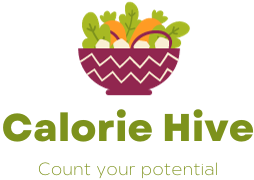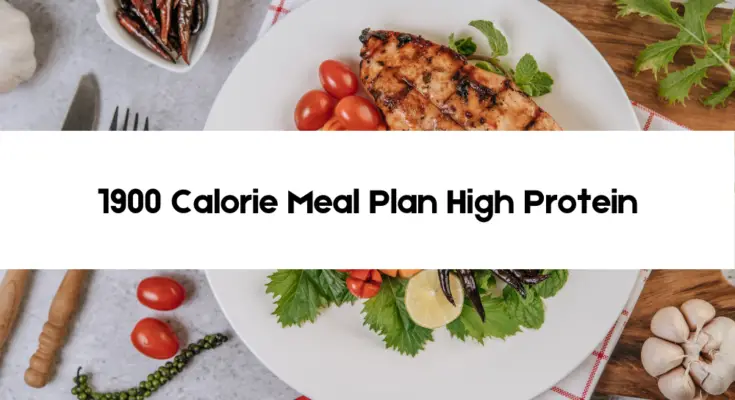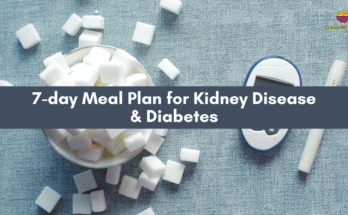Are you looking for a 1900 Calorie Meal Plan High Protein? A high-protein diet can be incredibly beneficial if you aim to build muscle, lose weight, or maintain a healthy lifestyle. This guide will walk you through the basics of a high-protein diet, offer a detailed 1900-calorie meal plan, and provide tips for optimizing your protein intake.
Understanding the Basics of a High Protein Diet
What is a High Protein Diet?
A high-protein diet emphasizes protein-rich foods essential for building and repairing tissues, producing enzymes and hormones, and supporting overall health. Protein is a macronutrient, alongside carbohydrates and fats, and is made up of amino acids, the body’s building blocks.
Benefits of a High-Protein Diet
- Muscle Growth and Repair: Protein is crucial for muscle growth and repair. It’s essential for athletes and those who engage in regular strength training.
- Weight Management: High-protein diets can aid in weight loss and weight management. Protein helps you feel fuller for longer, reducing overall calorie intake.
- Metabolic Boost: Protein has a higher thermic effect compared to fats and carbohydrates, meaning your body burns more calories digesting protein.
- Bone Health: Contrary to some myths, high-protein diets are beneficial for bone health. They help maintain bone density and reduce the risk of osteoporosis.
- Improved Heart Health: Some studies suggest that high-protein diets can improve heart health by lowering blood pressure and reducing LDL cholesterol levels.
Creating a 1900 Calorie Meal Plan High Protein
To create a 1900-calorie meal plan high in protein, it’s essential to balance your macronutrients. For this plan, we’ll aim for approximately 30% of your calories from protein, 40% from carbohydrates, and 30% from fats.
Daily Protein Target: Approximately 143 grams Daily Carbohydrate Target: Approximately 190 grams Daily Fat Target: Approximately 63 grams
Recipes 1900 Calorie Meal Plan High Protein
Breakfast: Protein-Packed Smoothie
- 1 scoop of whey protein powder (120 calories, 24g protein)
- 1 cup of unsweetened almond milk (30 calories, 1g protein)
- 1 medium banana (105 calories, 1g protein)
- 1 tablespoon of peanut butter (95 calories, 4g protein)
- 1/2 cup of Greek yogurt (65 calories, 10g protein)
- 1 tablespoon of chia seeds (60 calories, 2g protein)
Total: 475 calories, 42g protein
Mid-Morning Snack: Cottage Cheese and Berries
- 1/2 cup of low-fat cottage cheese (80 calories, 14g protein)
- 1/2 cup of mixed berries (35 calories, 0.5g protein)
Total: 115 calories, 14.5g protein
Lunch: Grilled Chicken Salad
- 4 oz of grilled chicken breast (165 calories, 31g protein)
- 2 cups of mixed greens (20 calories, 2g protein)
- 1/2 cup of cherry tomatoes (15 calories, 1g protein)
- 1/4 cup of shredded carrots (10 calories, 0.5g protein)
- 1/4 cup of cucumber slices (5 calories, 0.5g protein)
- 1 tablespoon of olive oil (120 calories, 0g protein)
- 1 tablespoon of balsamic vinegar (15 calories, 0g protein)
Total: 350 calories, 35g protein
Afternoon Snack: Protein Bar
- 1 high-protein bar (200 calories, 20g protein)
Total: 200 calories, 20g protein
Dinner: Baked Salmon with Quinoa and Broccoli
- 5 oz of baked salmon (280 calories, 31g protein)
- 1/2 cup of cooked quinoa (111 calories, 4g protein)
- 1 cup of steamed broccoli (55 calories, 4g protein)
Total: 446 calories, 39g protein
Evening Snack: Greek Yogurt with Almonds
- 1 cup of Greek yogurt (130 calories, 23g protein)
- 1/4 cup of raw almonds (200 calories, 8g protein)
Total: 330 calories, 31g protein
Daily Totals: 1916 calories, 181.5g protein
Tips for Optimizing Your 1900 Calorie Meal Plan High Protein
- Choose Lean Proteins: Opt for lean protein sources like chicken breast, turkey, fish, lean cuts of beef, and plant-based proteins like tofu and legumes.
- Incorporate Protein in Every Meal: Ensure that each meal and snack contains a good source of protein. This helps keep you full and maintains muscle mass.
- Hydrate: Drinking plenty of water is essential, especially on a high-protein diet, to help your kidneys process the increased protein intake.
- Balance Your Nutrients: While protein is crucial, don’t neglect carbohydrates and fats. Ensure a well-rounded diet with plenty of fruits, vegetables, whole grains, and healthy fats.
- Use Protein Supplements Wisely: Protein powders and bars can be convenient, but try to get most of your protein from whole foods.
High-Protein Foods to Include in Your 1900 Calorie Meal Plan
Animal-Based Proteins
- Chicken Breast: A staple in high-protein diets, chicken breast is lean and versatile.
- Turkey: Another lean meat, turkey is great for variety.
- Fish: Salmon, tuna, and cod are excellent sources of protein and healthy fats.
- Eggs: Affordable and nutrient-dense, eggs are a fantastic protein source.
- Greek Yogurt: Higher in protein than regular yogurt, it’s perfect for snacks and meals.
Plant-Based Proteins
- Lentils: Packed with protein and fiber, lentils are great in soups, salads, and stews.
- Chickpeas: Versatile and protein-rich, chickpeas can be used in hummus, salads, and curries.
- Tofu and Tempeh: These soy-based products are excellent meat substitutes.
- Quinoa: A complete protein, quinoa is a fantastic grain alternative.
- Nuts and Seeds: Almonds, chia seeds, and hemp seeds add protein and healthy fats to your diet.
Meal Prep Tips for a 1900 Calorie High Protein Diet
- Plan Ahead: Take time each week to plan your meals. This helps ensure you meet your protein goals without exceeding your calorie limit.
- Batch Cooking: Prepare large batches of protein-rich foods like grilled chicken, quinoa, and roasted vegetables to save time during the week.
- Portion Control: Use measuring cups and a food scale to keep your portions in check, helping you stick to your 1900 calorie limit.
- Variety is Key: Rotate your protein sources to prevent meal fatigue and ensure you get a wide range of nutrients.
- Healthy Snacks: Keep high-protein snacks on hand, such as Greek yogurt, cottage cheese, and protein bars, to help curb hunger between meals.
Conclusion
A 1900-calorie meal plan high in protein can help you achieve various health and fitness goals, from muscle building to weight management. By incorporating a variety of protein-rich foods, balancing your macronutrients, and planning your meals, you can enjoy the numerous benefits of a high-protein diet.
Remember, consistency is crucial, and small, sustainable changes often lead to the best results. Start with this guide, customize it to your preferences, and enjoy the journey to a healthier, stronger you.
FAQs
1. Can I lose weight on a 1900-calorie high-protein diet?
Yes, many people can lose weight on a 1900-calorie diet, especially if it is high in protein. Protein helps you feel fuller for longer, reducing overall calorie intake. However, weight loss depends on various factors, including your activity level, metabolism, and current weight.
2. Is it safe to follow a high-protein diet long-term?
For most people, a high-protein diet is safe and beneficial, especially when balanced with carbohydrates and fats. However, individuals with kidney problems should consult a healthcare provider before increasing their protein intake.
3. Can I build muscle on a 1900-calorie high-protein diet?
Yes, you can build muscle on a 1900-calorie diet if it provides adequate protein and is combined with strength training. However, some individuals may require more calories for optimal muscle growth, depending on their metabolism and activity level.
4. What if I’m vegetarian or vegan?
Vegetarians and vegans can still follow a high-protein diet by incorporating plant-based protein sources such as lentils, chickpeas, tofu, tempeh, quinoa, nuts, and seeds.
5. How do I avoid getting bored with my meals?
Variety is key to preventing meal fatigue. Rotate your protein sources, experiment with different recipes, and use various herbs and spices to keep your meals exciting and flavorful.
You may also like to read: 800 Calorie Diet Plan l Absolutely Best Guide




